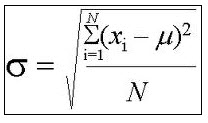Deviation Score Calculator
Instructions: This Deviation Score Calculator will compute the deviation with respect to the mean for a sample of data you provide in the form below:
Deviation Score Calculator
The idea of deviation score is used to determine how far each data is relative to the "center" of the distribution. Typically, the sample mean \(\bar X\) is considered as the center of the distribution.
How do you compute deviation scores?
Assume you have a sample of data \(X_1, X_2, ...., X_n\). For those sample values, you compute the sample mean as
\[ \bar X = \displaystyle \frac{1}{n} \sum_{i=1}^n X_i \]Then, for a given raw value \(X_i\), its associated deviation score is:
\[ \text{Deviation Score } = X_i - \bar X\]and you would compute this deviation score for each score in the sample.
Deviation scores and z-scores
As we mentioned, the deviation scores measure how far each data is relative to the center of the distribution. This distance is expressed in absolute terms, but at times, it is more useful to express them in relative terms.
That is where the z-scores play a role. By dividing the deviation scores by the standard deviation, we are normalizing those deviations, and we are assessing how far each data is relative to the center of the distribution, relative to the size of the standard deviation.
So, if that is the case and you are looking for relative deviation scores, you should use this z-score calculator instead.


